全国中考真题汇编——完形填空(10套)(含答案与解析)
- 格式:doc
- 大小:1.23 MB
- 文档页数:36
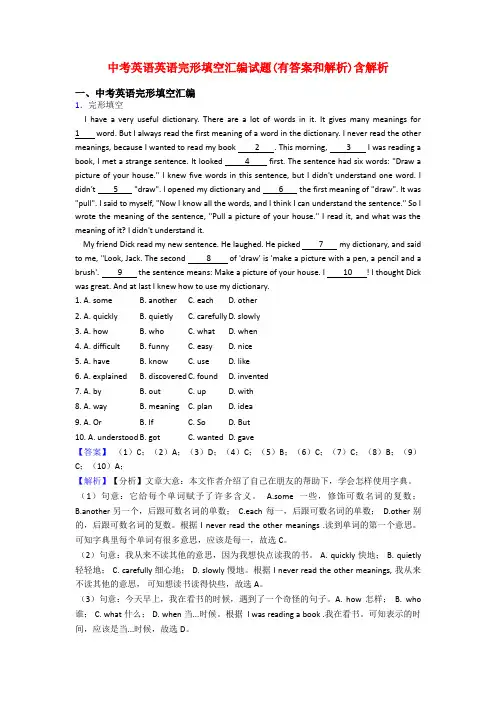
中考英语英语完形填空汇编试题(有答案和解析)含解析一、中考英语完形填空汇编1.完形填空I have a very useful dictionary. There are a lot of words in it. It gives many meanings for1 word. But I always read the first meaning of a word in the dictionary. I never read the other meanings, because I wanted to read my book2 . This morning,3 I was reading a book, I met a strange sentence. It looked4 first. The sentence had six words: "Draw a picture of your house." I knew five words in this sentence, but I didn't understand one word. I didn't5 "draw". I opened my dictionary and6 the first meaning of "draw". It was "pull". I said to myself, "Now I know all the words, and I think I can understand the sentence." So I wrote the meaning of the sentence, "Pull a picture of your house." I read it, and what was the meaning of it? I didn't understand it.My friend Dick read my new sentence. He laughed. He picked 7 my dictionary, and saidto me, "Look, Jack. The second 8 of 'draw' is 'make a picture with a pen, a pencil and a brush'. 9 the sentence means: Make a picture of your house. I 10 ! I thought Dick was great. And at last I knew how to use my dictionary.1. A. some B. another C. each D. other2. A. quickly B. quietly C. carefully D. slowly3. A. how B. who C. what D. when4. A. difficult B. funny C. easy D. nice5. A. have B. know C. use D. like6. A. explained B. discovered C. found D. invented7. A. by B. out C. up D. with8. A. way B. meaning C. plan D. idea9. A. Or B. If C. So D. But10. A. understood B. got C. wanted D. gave【答案】(1)C;(2)A;(3)D;(4)C;(5)B;(6)C;(7)C;(8)B;(9)C;(10)A;【解析】【分析】文章大意:本文作者介绍了自己在朋友的帮助下,学会怎样使用字典。
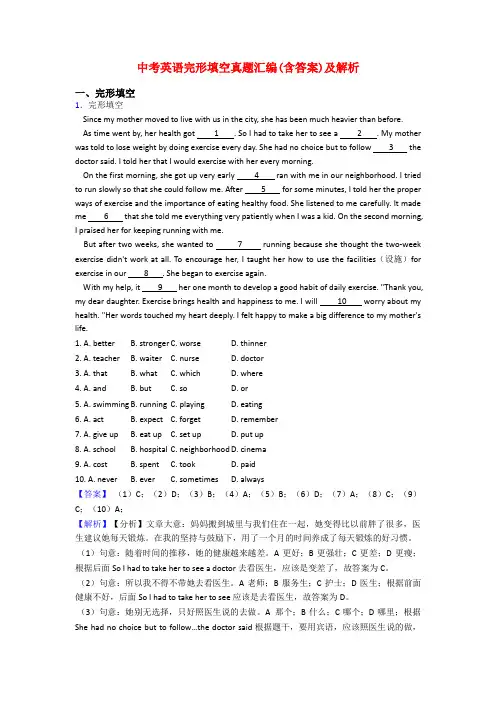
中考英语完形填空真题汇编(含答案)及解析一、完形填空1.完形填空Since my mother moved to live with us in the city, she has been much heavier than before.As time went by, her health got 1 . So I had to take her to see a 2 . My mother was told to lose weight by doing exercise every day. She had no choice but to follow 3 the doctor said. I told her that I would exercise with her every morning.On the first morning, she got up very early 4 ran with me in our neighborhood. I tried to run slowly so that she could follow me. After 5 for some minutes, I told her the proper ways of exercise and the importance of eating healthy food. She listened to me carefully. It made me 6 that she told me everything very patiently when I was a kid. On the second morning, I praised her for keeping running with me.But after two weeks, she wanted to 7 running because she thought the two-week exercise didn't work at all. To encourage her, I taught her how to use the facilities(设施)for exercise in our 8 . She began to exercise again.With my help, it 9 her one month to develop a good habit of daily exercise. "Thank you, my dear daughter. Exercise brings health and happiness to me. I will 10 worry about my health. "Her words touched my heart deeply. I felt happy to make a big difference to my mother's life.1. A. better B. stronger C. worse D. thinner2. A. teacher B. waiter C. nurse D. doctor3. A. that B. what C. which D. where4. A. and B. but C. so D. or5. A. swimming B. running C. playing D. eating6. A. act B. expect C. forget D. remember7. A. give up B. eat up C. set up D. put up8. A. school B. hospital C. neighborhood D. cinema9. A. cost B. spent C. took D. paid10. A. never B. ever C. sometimes D. always【答案】(1)C;(2)D;(3)B;(4)A;(5)B;(6)D;(7)A;(8)C;(9)C;(10)A;【解析】【分析】文章大意:妈妈搬到城里与我们住在一起,她变得比以前胖了很多,医生建议她每天锻炼。
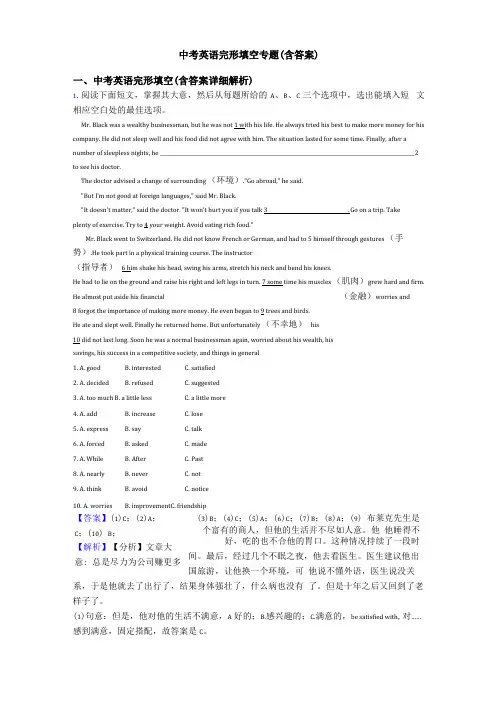
中考英语完形填空专题(含答案)一、中考英语完形填空(含答案详细解析)1.阅读下面短文,掌握其大意,然后从每题所给的A 、B 、C 三个选项中,选出能填入短 文相应空白处的最佳选项。
Mr. Black was a wealthy businessman, but he was not 1 with his life. He always tried his best to make more money for his company. He did not sleep well and his food did not agree with him. The situation lasted for some time. Finally, after a number of sleepless nights, he _______________________________________________________________________________________________________ 2 to see his doctor.The doctor advised a change of surrounding (环境)."Go abroad," he said."But I'm not good at foreign languages," said Mr. Black."It doesn't matter," said the doctor. "It won't hurt you if you talk 3 . Go on a trip. Take plenty of exercise. Try to 4 your weight. Avoid eating rich food."Mr. Black went to Switzerland. He did not know French or German, and had to 5 himself through gestures (手势).He took part in a physical training course. The instructor(指导者) 6 him shake his head, swing his arms, stretch his neck and bend his knees.He had to lie on the ground and raise his right and left legs in turn. 7 some time his muscles (肌肉)grew hard and firm. He almost put aside his financial(金融)worries and 8 forgot the importance of making more money. He even began to 9 trees and birds.He ate and slept well. Finally he returned home. But unfortunately (不幸地) his 10 did not last long. Soon he was a normal businessman again, worried about his wealth, hissavings, his success in a competitive society, and things in general1. A. goodB. interestedC. satisfied 2. A. decided B. refused C. suggested3. A. too much B. a little less C. a little more4. A. add B. increase C. lose5. A. express B. say C. talk6. A. forced B. asked C. made7. A. While B. After C. Past8. A. nearly B. never C. not9. A. thinkB. avoidC. notice 10. A. worries B. improvementC. friendship(3)B ;(4)C ;(5)A ;(6)C ;(7)B ;(8)A ;(9) 布莱克先生是个富有的商人,但他的生活并不尽如人意。
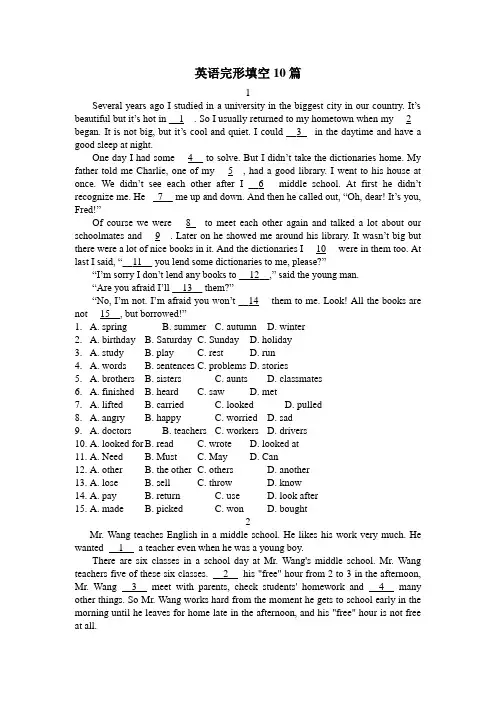
英语完形填空10篇1Several years ago I studied in a university in the biggest city in our country. It’s beautiful but it’s hot in __1__. So I usually returned to my hometown when my __2__ began. It is not big, but it’s cool and quiet. I could __3__ in the daytime and have a good sleep at night.One day I had some __4__ to solve. But I didn’t take the dictionaries home. My father told me Charlie, one of my __5__, had a good library. I went to his house at once. We didn’t see each other after I __6__ middle school. At first he didn’t recognize me. He __7__ me up and down. And then he called out, “Oh, dear! It’s you, Fred!”Of course we were __8__ to meet each other again and talked a lot about our schoolmates and __9__. Later on he showed me around his library. It wa sn’t big but there were a lot of nice books in it. And the dictionaries I __10__ were in them too. At last I said, “__11__ you lend some dictionaries to me, please?”“I’m sorry I don’t lend any books to __12__,” said the young man.“Are you afraid I’ll __13__ them?”“No, I’m not. I’m afraid you won’t __14__ them to me. Look! All the books are not __15__, but borrowed!”1. A. spring B. summer C. autumn D. winter2. A. birthday B. Saturday C. Sunday D. holiday3. A. study B. play C. rest D. run4. A. words B. sentences C. problems D. stories5. A. brothers B. sisters C. aunts D. classmates6. A. finished B. heard C. saw D. met7. A. lifted B. carried C. looked D. pulled8. A. angry B. happy C. worried D. sad9. A. doctors B. teachers C. workers D. drivers10.A. looked for B. read C. wrote D. looked at11.A. Need B. Must C. May D. Can12.A. other B. the other C. others D. another13.A. lose B. sell C. throw D. know14.A. pay B. return C. use D. look after15.A. made B. picked C. won D. bought2Mr. Wang teaches English in a middle school. He likes his work very much. He wanted 1 a teacher even when he was a young boy.There are six classes in a school day at Mr. Wang's middle school. Mr. Wang teachers five of these six classes. 2 his "free" hour from 2 to 3 in the afternoon, Mr. Wang 3 meet with parents, check students' homework and 4 many other things. So Mr. Wang works hard from the moment he gets to school early in the morning until he leaves for home late in the afternoon, and his "free" hour is not free at all.In his English lesson, Mr. Wang sometimes teaches poems (诗). He likes poems very much, and he likes Li Bai’s poems 5 of all.In his fifth class today, Mr. Wang taught a poem. He wrote the poem on the blackboard and read it. As soon as he finished 6 the poem, the students began to ask questions. He answered all the questions. Then he asked his students to talk about the poem. 7 one wanted to stop when the bell rang.8 home, Mr. Wang thought about the fifth class. He was happy about what he did as a teacher. Every one of his students 9 the poem. When they started to talk, they forgot about the time. He did not have to make them 10 . He only had to answer their questions and help them understand the poem.1. A. was B. being C. to be D. be2. A. In B. At C. To D. On3. A. has to B. has C. able to D. will4. A. take care for B. care ofC. take care ofD. be careful of5. A. better B. good C. well D. best6. A. reading B. to read C. read D. doing7. A. Not B. No C. Have no D. Any8. A. By the way B. To his wayC. On his wayD. In the way9. A. liked B. asked C. had D. wanted10. A. learning B. to learnC. learnD. leant3Many animals use some kinds of “language”. They use signals(信号) and the signals have meanings. For example, __1 a bee has found some food, it goes 2 its home. 3 is difficult for a bee to tell __4 bees where the food is speaking to them, but it can do a little dancing. This tells the bees where the food is and 5 it is.Some animals show 6 they feel by making sounds. It is not difficult to tell if a dog is angry because it barks. Birds make several different sounds and 7 has its meaning. Sometimes we humans make sounds in the same way. We make sounds like “Oh” to 8 how we feel about __9__ or we 10 something on our feet.We humans have languages. We have words. These words have meaning of things, action, feeling or ideas. We are able to __11__ each other information, to tell other people 12 we think or we feel. By writing down words, we can remember what has happened or 13 messages to people far away.Languages, like people, live and die. If a language is not used by people, it is called a dead language. This language cannot live and grow because 14 speaks it.A living language, of course, is often spoken by people today. It grows and changes with time. New words are created, and some old words have 15 meanings.1. A. because B. since C. when D. as2. A. out of B. back from C. away from D. back to3. A. It B. This C. That D. He4. A. each other B. another C. the other D. others5. A. how long B. how far away C. how many D. how old6. A. why B. which C. how D. what7. A. each B. every C. all D. some8. A. show B. say C. talk D. speak9. A. everything B. something C. nothing D. anything10. A. put B. drop C. fall D. set11. A. give B. put C. show D. take12. A. that B. which C. what D. why13. A. send B. bring C. push D. get14. A. someone B. no one C. anyone D. everyone15. A. new B. right C. real D. good4It’s never easy to admit(承认) you are in the wrong. We all __1__ to know the art of apology. Think how often you’ve done wrong. Then count how many __2__ you’ve expressed clearly you were __3__. You can’t go to bed with an easy mind if you do __4__ about it.A doctor friend, Mr. Lied, told me about a man who came to him with different kinds of signs: headaches, heart __5__ and insomnia (失眠). __6__ some careful exams, Mr. Lied found nothing ___7__ with him and said, “If you don’t tell me what’s __8__ you, I can’t help you.” The man admitted he was cheating his brother of his inheritance(遗产). Then and there the __9__ doctor __10__ the man write to his brother and __11__ his money. As soon as the __12__ was put into the post box, the man suddenly cried. “Thank you,” he said to the doctor, “I think I’ve got __13__.”An apology can not only save a broken relationship(关系) but also make it __14__. If you can think of someone who should be __15__ an apology from you. Do something about it right now.1. A. decide B. have C. need D. try2. A. mistakes B. people C. ways D. times3. A. sorry B. weak C. sad D. wrong4. A. something B. anything C. nothing D. everything5. A. trouble B. matter C. illness D. problem6. A. Before B. After C. Till D. Since7. A. well B. wrong C. good D. bad8. A. hurling B. changing C. touching D. worrying9. A. clever B. silly C. good D. kind10. A. made B. helped C. saw D. let11. A. returned B. gave C. kept D. paid12. A. paper B. box C. money D. letter13. A. better B. well C. sick D. worse14. A. never B. worse C. stronger D. harder15. A. given B. received C. known D. forgotten5Mr. and Mrs. king have lived in our town for nearly twenty years. They have a bookshop by the bus station. They’re __1__ to everybody and have a lot of friends. They often __2__ the poor students and sell them some books cheaply. So there’re many young men in their shop. Of course people __3__ them and their friends often call on (拜访) them and __4__ them. We can always hear their rooms are full of __5__ and quarrel.It was a Friday evening. Mr. and Mrs. King were going to have a picnic on the island the next __6__. It was a little far from our town. So they had to __7__ earlier than usual to catch a six o’clock train. After __8__ a few friends came t o see them while they were cooking some __9__ and drinks for the picnic. Mr. king and his wife had to stop __10__ them. They talked a lot and few of them looked at the __11__ on the wall. Mr. and Mrs. King were anxious (焦急) but they couldn’t tell the visitors about it. The woman thought for a few __12__ and had an idea. She said to her __13__, “Oh, it’s eleven o’clock! You’d better stop talking, dear! Our guests are anxious to __14__!Mr. king heard this and stood up and said __15__ to the visitors and they left soon.1. A. had B. polite C. cold D. careful;2. A. help B. hurt C. hit D. watch3. A. know B. understand C. meet D. like4. A. play with B. fight with C. talk with D. catch up with5. A. cry B. shout C. noise D. laugh6. A. morning B. afternoon C. evening D. laugh7. A. go to work B. get up C. go to sleep D. open the shop8. A. breakfast B. lunch C. supper D. meal9. A. clothes B. bags C. books D. food10. A. receive B. to receive C. receiving D. to accept11. A. phone B. photo C. clock D. picture12. A. minutes B. days C. weeks D. months13. A. visitor B. husband C. brother D. father14. A. go home B. go to bed C. go shopping D. have a rest15. A. hello B. goodbye C. sorry D. nothing6Martin Henfield talks about some of his experience(经历) as a twin: when we were small my mother dressed us __1_ the same clothes. That was bad enough and we didn’t like it. But we went on our first camping trip, it was even __2__. We were only ten years old, and while __3_ went into their sleeping bags for the _4__, we were not happy to snuggle(偎依) inside a double sleeping bag my mother made for us.At school our classmates __5__us Henfield One and Henfield Two, so people ___6__ even see our difference according to our initials because __7__ of us were M.O. It was only when I went to _8___ and began to have my own friends that I started to feel my own freedom of identity(身份).Before I went to college, during my secondary school __9__, I __10__ to a job ona building site. My twin brother, Mike Henfield, didn’t work. One day I asked my boss, “Can I have a week _11__?” “Certainly,” he said, “but you won’t have the job when you 12__ back.” I didn’t want to __13__ the job. So on Monday morning, Mike went there in my _14__, jacket and hat and he worked for me for one week __15___ of them knew the difference.1. A. in B. for C. on D. with2. A. badder B. worse C. good D. better3. A. all boys B. another boyC. all the other boysD. all the boys4. A. day B. holiday C. night D. mid-night5. A. called B. knew C. told D. made6. A. didn’t B. needn’t C. mustn’t D. couldn’t7. A. very B. each C. both D. all8. A. middle school B. college C. high school D. school9. A. holidays B. week C. weekend D. holiday10. A. received B. got C. find D. made11. A. off B. free C. on D. back12. A. came B. will get C. got D. are13. A. miss B. lose C. lost D. losing14. A. coat B. shirt C. shoes D. trousers15. A. None B. Nobody C. All D. Each7Have you ever seen the advertisement: Learn a foreign language in six weeks, 1 give your money back? Of course, it 2 happens quite like that. The only language 3 to learn is the mother language. And think 4 practice is needed for that. Before the Second World War people usually learned a foreign language 5 the literature(文学) of the country. Now most people want to 6 a foreign language. Every year millions of people start learning 7 .How do they do it? Some people try at home 8 books and tapes, others go to evening classes or watch TV programs. 9 they use the language only 2 or 3 times a week, learning it will 10 a long time, like language learning at school. A few people try to learn a language fast by studying for 6 or 11 hours a day. It's much easier to learn the language in the country where it 12 . But most people are 13 to do this, and many people don't have to do so. Machines and good books will be very 14 , but they can not do the students' work. 15 the language is learned quickly or slowly, it is hard work.1. A. so B. or C. and D. but2. A. can't B. impossible C. never D. often3. A. easily B. difficult C. able D. easy4. A. how much B. how long C. how fast D. how many5. A. studied B. to study C. studying D. study6. A. talk B. tell C. speak D. say7. A. them B. this C. that D. it8. A. without B. with C. in D. by9. A. If B. When C. Since D. Until10. A. spend B. use C. take D. cost11. A. some B. more C. other D. less12. A. speaks B. is speaking C. spoke D. is spoken13. A. able B. possible C. unable D. not possible14. A. careful B. forgetful C. wonderful D. helpful15. A. either B. whether C. what D. how8I have tried many ways to be 1 . I don’t wear a sweater when I 2 , and two days ago I walked in the 3 without my shoes. But so far nothing 4 . Debbie once told me about a boy in her class who liked 5 school. He would rub(摩擦) the end of the thermometer (温度计) until it went 6 to 39℃. Then he’d put it in his mouth and his mother would think he was 7 ill.This morning I tried doing that but it 8 went above 35℃ and I rubbed it for ten 9 . So I held the thermometer 10 the light on my desk and it went up to 40℃. I thought I’d put it in my mouth and walk downstairs like that. 11 my mother would take it out and she would be 12 when she saw that I was rather ill.The only trouble was I didn’t know the thermo meter would be so 13 , As soon as I put it into my mouth I burnt my tongue(舌头)! I spit (吐) the thermometer out. It fell 14 the floor but it 15 .1. A . well B. fine C. ill D. bad2. A . could B. should C. must D. might3. A . water B. rain C. sun D. wind4. A . happens B. happened C. will happen D. has happened5. A . being away from B. leavingC. staying atD. being out of6. A . on B. down C. up D. off7. A . really B. real C. bad D. badly8. A . can’t B. not C. never D. didn’t9. A . seconds B. hours C. minutes D. moments10. A . near B. near to C. next D. next to11. A . When B. Then C. So D. If12. A . worried B. surprised C. happy D. frightened13. A . cold B. hot C. warm D. cool14. A . off B. down C. to D. on15. A . didn’t break B. didn’t broke C. wasn’t broken D. was broken9Do you know Eskimos (爱斯基摩人)? Let me tell you something about their 1 .The Eskimos live near the North Pole (北极). There are only two 2 there, winter and summer, There are no spring 3 autumn there. The winter nights are 4 . You can't 5 the sun for more than two months, even at noon. The summer days are long. For more than two months, the sun never 6 and there is no night.The Eskimos have 7 clothes. They make their clothes from the skin of animals. From these skins they make coats, caps and 8 .Near the North Pole trees can't grow, for it is too 9 there. The Eskimos 10 make their houses from skins, snow or stones (石头). When they 11 in storm and can't 12 home, they make house of snow. They 13 these snow houses when the storm is 14 .Life is 15 for the Eskimos, but they still like to live there.1. A. work B. life C. holiday D. families2. A. weather B. seasons C. months D. years3. A. not B. or C. and D. as4. A. short B. warm C. long D. cold5. A. see B. watch C. look D. look at6. A. rises B. goes up C. drops D. goes down7. A. beautiful B. metal C. warm D. cool8. A. goods B. drinks C. medicine D. shoes9. A. cold B. hot C. dry D. wet10. A. will B. should C. never D. have to11. A. go out B. go over C. keep on D. get on12. A. get back B. got off C. get on D. get in13. A. make B. leave C. stay D. break14. A. over B. coming C. going D. hard15. A. easy B. interesting C. hard D. lucky10Life in the twenty-first century will be very 1 . Many changes will take place, but 2 will the changes be.The population is growing 3 . There will be many 4 in the world and most of them will live 5 than people in the twentieth century.Computers will be much smaller and 6 and there will be at least one in every 7 . And 8 studies will be one of the important subjects in school then.People wil l work 9 and they will have more free time for sports, watching TV and travelling. 10 will be much easier and cheaper. And many more people will go to 11 countries for holidays.There will be changes in our 12 , too. Maybe no one will eat meat every day, instead, they eat more fruit and vegetables. Maybe people will be 13 . Work in the future will be different, too. 14 and hard work can be done by robots. Because of this, 15 will not have enough work to do .This will be a problem.1. A. interesting B. hard C. different D. beautiful2. A. why B. how C. when D. what3. A. slowly B. fast C. quietly D. suddenly4. A. people B. workers C. scientists D. doctors5. A. long B. longer C. happy D. lucky6. A. more useful B. useful C. helpful D. less useful7. A. hospital B. factory C. home D. town8. A. science B. maths C. English D. computer9. A. fewer hours B. more hoursC. eight hoursD. more than eight hours10. A. Seeing doctors B. Going to the cinemaC. ShoppingD. Travelling11. A. rich B. other C. poor D. small12. A. food B. clothes C. fruit D. drinks13. A. fatter B. thinner C .healthier D. more pleased14. A. Safe B. Easy C. Simple D. Dangerous15. A. a few people B. all the peopleC. many peopleD. some people1 名师点评这篇短文主要讲了Charlie家里有许多藏书,却没有一本是自己买的,所以他从不借书给别人,因为他怕别人都和他一样。
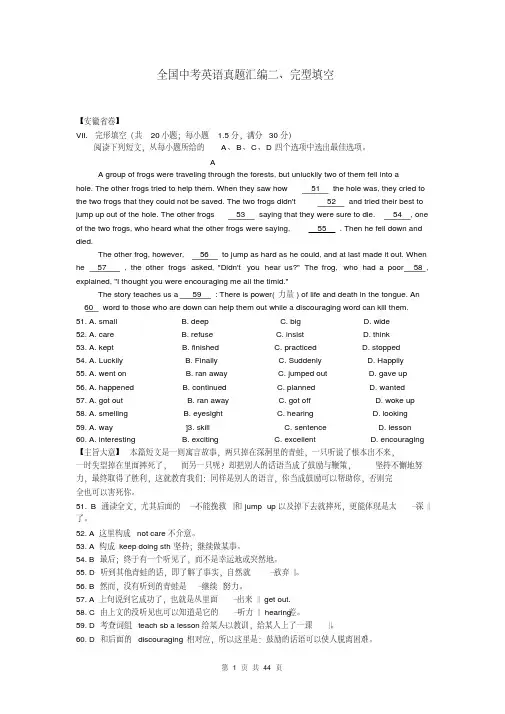
全国中考英语真题汇编二、完型填空【安徽省卷】VII. 完形填空(共20小题;每小题 1.5分,满分30分)阅读下列短文,从每小题所给的A、B、C、D四个选项中选出最佳选项。
AA group of frogs were traveling through the forests, but unluckily two of them fell into ahole. The other frogs tried to help them. When they saw how 51 the hole was, they cried to the two frogs that they could not be saved. The two frogs didn't 52 and tried their best to jump up out of the hole. The other frogs 53 saying that they were sure to die. 54 , one of the two frogs, who heard what the other frogs were saying, 55 . Then he fell down and died.The other frog, however, 56 to jump as hard as he could, and at last made it out. When he 57 , the other frogs asked, "Didn't you hear us?" The frog, who had a poor 58 , explained, "I thought you were encouraging me all the timid."The story teaches us a 59 : There is power(力量) of life and death in the tongue. An60 word to those who are down can help them out while a discouraging word can kill them.51. A. small B. deep C. big D. wide52. A. care B. refuse C. insist D. think53. A. kept B. finished C. practiced D. stopped54. A. Luckily B. Finally C. Suddenly D. Happily55. A. went on B. ran away C. jumped out D. gave up56. A. happened B. continued C. planned D. wanted57. A. got out B. ran away C. got off D. woke up58. A. smelling B. eyesight C. hearing D. looking59. A. way ]3. skill C. sentence D. lesson60. A. interesting B. exciting C. excellent D. encouraging 【主旨大意】本篇短文是一则寓言故事,两只掉在深洞里的青蛙,一只听说了根本出不来,一时失望掉在里面摔死了,而另一只呢?却把别人的话语当成了鼓励与鞭策,坚持不懈地努力,最终取得了胜利,这就教育我们:同样是别人的语言,你当成鼓励可以帮助你,否则完全也可以害死你。
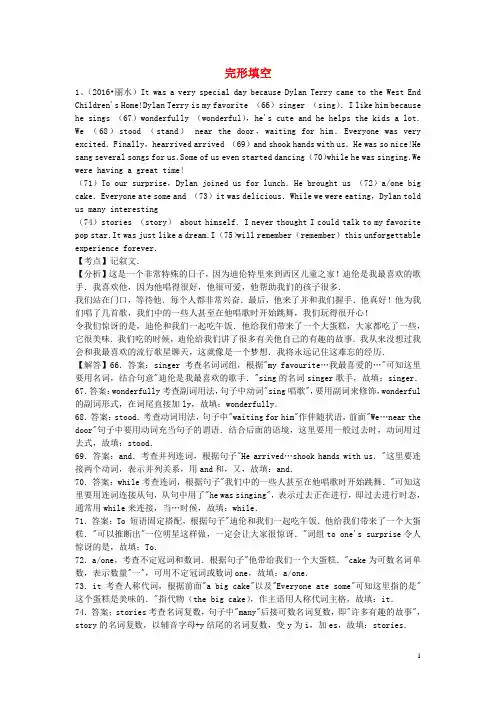
完形填空1、(2016•丽水)It was a very special day because Dylan Terry came to the West End Children's Home!Dylan Terry is my favorite (66)singer (sing).I like him because he sings (67)wonderfully (wonderful),he's cute and he helps the kids a lot.We (68)stood (stand)near the door,waiting for him.Everyone was very excited.Finally,hearrived arrived (69)and shook hands with us.He was so nice!He sang several songs for us.Some of us even started dancing (70)while he was singing.We were having a great time!(71)To our surprise,Dylan joined us for lunch.He brought us (72)a/one big cake.Everyone ate some and (73)it was delicious.While we were eating,Dylan told us many interesting(74)stories (story) about himself.I never thought I could talk to my favorite pop star.It was just like a dream.I (75)will remember (remember) this unforgettable experience forever.【考点】记叙文.【分析】这是一个非常特殊的日子,因为迪伦特里来到西区儿童之家!迪伦是我最喜欢的歌手.我喜欢他,因为他唱得很好,他很可爱,他帮助我们的孩子很多.我们站在门口,等待他.每个人都非常兴奋.最后,他来了并和我们握手.他真好!他为我们唱了几首歌,我们中的一些人甚至在他唱歌时开始跳舞,我们玩得很开心!令我们惊讶的是,迪伦和我们一起吃午饭.他给我们带来了一个大蛋糕,大家都吃了一些,它很美味.我们吃的时候,迪伦给我们讲了很多有关他自己的有趣的故事.我从来没想过我会和我最喜欢的流行歌星聊天,这就像是一个梦想.我将永远记住这难忘的经历.【解答】66.答案:singer考查名词词组,根据"my favourite…我最喜爱的…"可知这里要用名词,结合句意"迪伦是我最喜欢的歌手."sing的名词singer歌手,故填:singer.67.答案:wonderfully考查副词用法,句子中动词"sing唱歌",要用副词来修饰,wonderful 的副词形式,在词尾直接加ly,故填:wonderfully.68.答案:stood.考查动词用法,句子中"waiting for him"作伴随状语,前面"We…near the door"句子中要用动词充当句子的谓语.结合后面的语境,这里要用一般过去时,动词用过去式,故填:stood.69.答案:and.考查并列连词,根据句子"He arrived…shook hands with us."这里要连接两个动词,表示并列关系,用and和,又,故填:and.70.答案:while考查连词,根据句子"我们中的一些人甚至在他唱歌时开始跳舞."可知这里要用连词连接从句,从句中用了"he was singing",表示过去正在进行,即过去进行时态,通常用while来连接,当…时候,故填:while.71.答案:To 短语固定搭配,根据句子"迪伦和我们一起吃午饭.他给我们带来了一个大蛋糕."可以推断出"一位明星这样做,一定会让大家很惊讶."词组to one's surprise令人惊讶的是,故填:To.72.a/one,考查不定冠词和数词.根据句子"他带给我们一个大蛋糕."cake为可数名词单数,表示数量"一",可用不定冠词或数词one,故填:a/one.73.it考查人称代词,根据前面"a big cake"以及"Everyone ate some"可知这里指的是"这个蛋糕是美味的."指代物(the big cake),作主语用人称代词主格,故填:it.74.答案;stories考查名词复数,句子中"many"后接可数名词复数,即"许多有趣的故事",story的名词复数,以辅音字母+y结尾的名词复数,变y为i,加es,故填:stories.75.will remember考查时态,根据句子中"forever永远"及句子意思"我将永远记住这难忘的经历"这里要用一般将来时,表示意愿,要用助动词will+动词原形,故填:will remember.2、(2016•宁波)Long long ago,there was a small village in the Middle East.In the village there was (61)an old man called Sthira.He lived by himself.His only son had gone far away to study.Sthira's friends (62)wondered(wonder)whether his son would return,(63)but Sthira always said,"Whatever happens,happens for good." One day the old man's son returned and the villages were very happy for Sthira.He thaked the villages and said (64)politely (polite),"Whatever happens,happens for good."However,later,Sthira's son broke his (65)leg.Once again the villages came to visit him and once again the old man thanked (66)them (they) and said,"Whatever happens,happens for good."Some of the villages were surprised (67)to hear(hear) this.Why?What was good?His son's leg got badly hurt!After a few days,the army came to the village and forced all the young men to (68)join the army.When they found his son had a (69)broken (break) leg,they left him behind.Once again,all the villagers came to congratulate him on his (70)good luck,like always,the old man was still thankful to them and said,"Whatever happens,happens for good."【考点】记叙文.【分析】这是一篇记叙文,文章大意是:很久以前,中东的一个小村庄里一位老人Sthira 独自居住,他唯一的儿子离家去学习了,他的朋友想知道他的儿子是否会回来,但是Sthira 总是说"无论发生了什么.都是好事."一天他的儿子回来了,村民为Sthira感到高兴,他十分感谢并高兴的说"无论发生什么,都是好事"然而,不久他的儿子的腿受伤了.每次村民去看望他,老人都感谢的说"无论发生什么,都是好事"一些村民感到奇怪,为什么?什么是好?他的儿子的腿都重伤了!几天后,军队来人强迫年轻人去参军,他们发现他的儿子的腿受伤了,就把他落下了,所有的村民都来祝贺他的好运,就像平常一样,老人感谢的说"无论发生什么,都是好事".故事告诉我们人生之路布满了鲜花与荆棘.但是,无论前方的路多么坎坷,我们都应该像故事里的老人那样,保持乐观的心态,看到事情好的一面.【解答】61.答案:an.there be表示有,be动词的单复数遵循就近原则,这里是was单数,故后面是单数名词,old是以元音音素[əu]开头,故用不定冠词an,故答案是an.62.答案:wondered.这里是Long long ago很久很久以前的故事,用一般过去时,wonder 是动词想知道,过去式是wondered,故答案是wondered.63.答案:but.前文的含义是他的朋友想知道他的儿子是否会回来,后面老人不是正面回答,而是说"无论发生了什么.都是好事."故用but表示转折,故答案是but.64.答案:politely.空格处是用来修饰动词said,用副词,所给单词polite是形容词礼貌的,副词是politely,故答案是politely.65.答案:leg.根据后面的His son's leg got badly hurt他儿子的腿严重受伤了,his 是形容词性物主代词,后加名词,故答案是leg.66.答案:them.根据前文是the villages村民们去看他,是复数,作为thank感谢的宾语,用宾格,they的宾格是them,故答案是them.67.答案:to hear.根据be surprised to do sth 做某事很惊奇,所给单词是动词hear 听,故答案是to hear.68.答案:join.结合前文the army came to the village and forced all the young men to 是军队来人强迫年轻人参军,参加军队用动词join表示参加,故答案是join.69.答案:broken.leg是名词,前面用形容词来修饰,再结合前后句意是说发现了Sthira 的儿子的一只受伤了的腿,受伤过了的,用过去分词充当形容词,break受伤,过去分词是broken,故答案是broken.70.答案:good.根据上文是说他儿子因为受伤所以不用参军,村民来祝贺他,故这里应该是好运气,luck是名词运气,前面用形容词good好的来修饰.,故答案是good3、(2016•上海)A)realize B)public C)experiment D)pollution E)plasticThe scientist was in a hurry.She had to get some water for her (46)Cbefore darkness fell.She was testing the water in the rivers that went into the ocean.Her job was to find out the cause of (47)Din the sea at nearby beaches.She lifted out the water and looked angrily at the rubbish in it.Old clothers,(48)Ebags and pieces of paper were in the dirty water."Don't people (49)Athat everything they throw onto the street gets washed into rivers?And they lead right into the ocean!"she said loudly."How many years will it take to make it clean again?"【考点】记叙文.【分析】这位科学家很匆忙.她必须在夜幕降临之前去取些水进行实验,她正在测试流进海洋的河水.她的任务是查明在海滩附近的海水污染的原因.她提起了水,生气地看着里面的垃圾.旧衣服,塑料袋,纸都在脏水里."难道没有人意识到他们扔到街上的所有东西都被冲进河流吗?它们又正好流入海洋.她大声地说:"要多少年才能使它(海水)重新干净呢?"【解答】46.C 考查名词用法.根据关键部分get some water for her…可知形容词性物主代词后应该跟名词;结合后句She was testing the water in the rivers that went into the ocean(她正在测试流进海洋的河水)可推知此处应是指取一些水做实验,结合选项故用名词experiment实验.故选C47.D 考查名词用法.根据关键部分find out the cause of…可知of相当于名词所有格的功能,其后应该跟名词;结合后句She lifted out the water and looked angrily at the rubbish in it.(她提起了水,生气地看着里面的垃圾)可知水被污染了,所以这里应是指查明海水污染的原因,结合选项故用名词pollution"污染".故选D.48.E 考查形容词用法.根据Old clothers,…bags and pieces of paper were in the dirty water可知这些东西都是海水里的垃圾,结合bags可知前面缺少一个形容词来修饰是什么样的袋子,因为是垃圾,所以联想到白色污染塑料袋,结合选项应用形容词plastic"塑料的".故选E49.A 考查动词用法.根据"Don't people…that…可知that后引导宾语从句,故空处应该为动词;结合后面everything they throw onto the street gets washed into rivers?联系前面可知此句为反意疑问句,表达肯定的意义;"他们扔到街上的所有东西都被冲刷进河流"是客观事实,所以此处应是反问难道没有意识到这一点吗?结合选项应该用动词realize"意识到".故选A4、(2016•嘉兴)Alison Lapper,a very unusual painter,paints pictures for a living.She doesn't use her (51)hands(手)when she paints.She uses her mouth!Alison was born (52)without (没有)any arms.Her physical problem caused her to spend the first (53)seventeen (十七)years of her life in a hospital.But this didn't stop her from making her dreams in life come true.She (54)realized(认识到)that even though she was disabled,she could express herself as freely as (55)normol (正常的)people.This was what got her to start drawing paintings.Although Alison lives (56)quite(十分)a different life from others,she believes that she can (57)succeed(成功)as others.Her paintings are excellent and they do not look like they were drawn by (58)someone/somebody(某人)who used her mouth.Alison has become a symbol of (59)courage(勇气).Her active way of living has encouraged many disabled people around the (60)world(世界)and will continue to do so in the future.【考点】记叙文.【分析】艾尔森•拉普是一个非同寻常的画家,她以画画谋生.她画画不用自己的手.她用嘴画!艾尔森出生时没有胳膊.她的身体问题导致她在医院度过了十七年.但是这并没有阻止她实现自己的梦想.她认识到即使她是残缺的,但她依然能像正常人一样自由地表达自己.这是让她画画的原因.即使艾尔森跟别人的生活十分不一样,她仍然相信她能跟别人一样成功.她的画很优秀,看起来并不像某个人用嘴画的.艾尔森已经成了勇气的象征.她积极的生活方式已经鼓励了世界上很多的残疾人并将在将来持续下去.【解答】51.hands 考查名词单复数.她不用手作画,所以此处应填hand的复数形式hands 52.without 考查介词.她出生时就没有胳膊,此处应用介词without表示否定53.seventeen 考察基数词的用法.自她出生十七年一直在医院度过,所以应填基数词seventeen54.realized/realized 考查动词的时态.她意识到即使她是残疾的,但她依然能像正常人一样表达自己.意识到:realize,再结合语境,此处应为一般过去时.故填:realized 55.normal 考查形容词.她能像正常人一样自由地表达自己.正常的:normal 56.quite 考查副词.艾尔森的生活和他人十分不一样.这里的"十分"为副词:quite 57.succeed 考查动词.她能像别人一样成功.情态动词后,动词用原形.故填:succeed 58.someone/somebody 考查不定代词.看起来并不像某人用嘴画得,这里的"某人"为不定代词someone/somebody59.courage 考查名词.她已经成了勇气的象征.此处为名词,勇气:courage 60.world 考查名词世界上很多的残疾人.这里的"世界"为名词world5、(2016•上海)A)bright B)filled with C)exactly D)worried about E)immediatelyThe scientist felt sad deep in her heart.She (50)Dthe oceananimals as she walked back to the beach.But when she got there,a group of students and teachers from a local primary school werecarrying bags of rubbish to the bins.They had spent theirafternoon cleaning the beach!She was (51)Bjoy.As she spoke with the teacher,the students gathered aroundthem.With (52)Asmiles on their faces,they shouted,"We mustdo something to protect the ocean!""That's(53)Cright,"agreed the scientist,as she smiled at their kindness.【考点】记叙文.【分析】这个科学家很伤心.在她走回沙滩的时候,她很担心海洋生物.当她到达的时候,她看见一群当地的小学生正拿着垃圾袋收集塑料瓶.他们用了整整一个下午在清理沙滩.她很开心.当她跟老师交谈的时候,学生都围过来听.他们脸上洋溢着快乐,呼喊着:"我们必须为保护环境做点儿事情!""很对!"科学家说,她脸上挂满了微笑.【解答】50.D 由后文的转折连词But可知,前后的内容是相反的,后面是让她感到惊喜的场景,因此可推知在去沙滩的路上,她心里很担忧,因此此处为worried about.51.B 此处需表达的是看到前面的情景,科学家心里充满了快乐,需用到短语be filled with,因此答案为B.52.A with后面加名词,表示伴随,smiles为名词,前面用形容词修饰,可知为A,A为形容词,bright.53.C right为形容词,需由副词修饰,可推知为C或者E,一般不用E来修饰right,表达"很对",可以用exactly修饰,故答案为C.6、(2016•绵阳)find book big how mind clever swim school always nameMany years ago,there was a family named Franklin.They lived in Boston.There were five girls and six boys in the family.On a January day in 1706another baby was born.The boy's mother and her husband gave the boy a (66)name-Benjamin.Benjamin was the(67)cleverest of all the children.He could read when he was five and he could write when he was seven.The next year his parents sent him to (68)school.At school Benjamin was good at reading and writing,but not good at maths.He readall of his father's (69)books.And when he had money,he (70)alwayswent to buy books.He liked books.They told him (71)howto do something.The boy liked to use his head and tried to(72)find ways to help people enjoy life more.For example,he tried to know if there was some way to (73)swimfarther,maybe with somethingon his hands or feet.Slowly a picture of swimming shoes,or paddles,grew in his (74)mind.The paddles must be neither too (75)big nor too small.And they mustbe neither too heavy nor too light.At last he invented the paddle for swimming.【考点】记叙文.【分析】很多年前,有一个富兰克林家族,他们住在波士顿.家里有五个女孩,六个男孩.1706年1月的一天,家里又添了一个男孩.这个男孩的妈妈和她的丈夫给这个男孩取了一个名字-本杰明.本杰明是所有孩子中最聪明的.他五岁能读七岁就能写了.第二年他的父母把他送到了学校.在学校,本杰明擅长阅读和写作,但不擅长数学.他读了他爸爸所有的书.并且当他有钱的时候,他总是会去买书.他喜欢书,它们告诉他怎么做事情.这个男孩喜欢动脑筋并且尝试帮助人们更加享受生活.例如,他想知道有没有方法可以让人游得更远,比如在人的手脚上戴一些东西.慢慢地,他的脑海中勾勒出了游泳鞋或短桨的图案.短桨必须不大也不小,并且不轻也不重.最终他发明了游泳用的短桨.【解答】66.name 考查名词根据下文的"Benjamin"可知,这是一个名字,故答案为name 67.cleverest 考查形容词的最高级根据"He could read when he was five and he could write when he was seven"可知本杰明是一个聪明的孩子,又因为"the __ of all the children"可知这里应该用最高级,故答案为 cleverest68.school 考查名词根据下文的"At school"可知他的父母把他送去了学校,故答案为school69.books 考查名词复数根据"He read all of his father's"中的read,再结合选项可知,此处应填book的复数形式books70.always 考查频率副词根据下文"He liked books 他喜欢书"可知,此处应填频率副词always"他有钱的时候总是买书"来突出他对书的喜欢.71.how 考查副词根据"__ to do something"可知此处应选how 怎么,故答案为how72.find 考查动词根据句意"The boy liked to use his head and tried to _ waysto help people enjoy life more.这个男孩喜欢动脑筋并尝试_方法帮助人们享受生活"可知此处应为"寻找方法"的意思,try to do sth 此处为动词的不定式形式,故答案为find 73.swim 考查动词根据下文的"swimming shoes"可知此处应为swim 游得更远;the wayto do sth,此处swim用原形,故答案为swim74.mind 考查名词根据句意"Slowly a picture of swimming shoes,or paddles,grew in his _ 慢慢地,他的-中勾勒出了游泳鞋和短桨的图案"可知此处应为"脑海,头脑"的意思,in one's mind在某人的头脑里.故答案为mind75.big 考查形容词根据句意"The paddles must be neither too _ nor too small.短桨必须不_也不小"可知此处应为small的反义词,故答案为big7、(2016•达州)children discourage under kiss upset shout lookbeg bring somethingA long time ago,a man punished his 3-year-old daughter for wastinga roll of gold wrapping(包着的)paper.Money was tight and he becamevery angry when the child tried to decorate(装饰)a box to put(76)underthe Christmas tree.However,the little girl(77)broughtthe gift to her father the next morning and said,"This is for you,Daddy."The father was(78)upsetby his earlier overreaction(过激的),but his anger rose again when he found out the box was empty.He(79)shoutedat her."Don't you know,when you give someone a present,there should be(80)somethinginside?"The little girl(81)lookedup at him,tears filled in her eyes,and cried,"Oh,Daddy,it's not empty at all.I blew(82)kissesinto the box.They are all for you,Daddy."The father was shocked.He put his arms around his little girl,and he(83)beggedfor her forgiveness.Only a short time later,an accident took the life of the child.Her father keptthat gold box by his bed for many years,and whenever he was(84)discouraged,he would take out an imaginary kiss and remember the love of his(85)childwho hadput it there.【考点】记叙文.【分析】很久以前,一个男人因为他三岁的女儿浪费了一卷金色的包装纸而惩罚她.本来钱就紧巴巴的,所以当他的孩子试图装饰一个放在圣诞树下面的盒子时,他非常生气.然而,第二天早晨小女孩把礼物拿给爸爸说:"这是送你的,爸爸."爸爸因为之前的过激反应很难过.但当他发现盒子是空的时,他又生气了.他对着女儿大喊:"你难道不知道当你送别人礼物时,里面应该有东西吗?"小女孩望着他,眼泪充满眼眶,哭着说:"噢,爸爸,它不是空的.我放了很多吻在里面.它们都是给你的,爸爸."爸爸被震惊了,他怀抱着他的小女孩,然后请求原谅.没过多久,一场事故带走了这个孩子的生命.他的爸爸把这个金色的盒子放在床边很多年,无论任何他觉得气馁的时候,就会取出一个想象中的吻,想起女儿放进去的爱.【解答】76:under 在…下面考查介词根据"put __ Christmas tree.放在圣诞树的…"可知,这里应该是一个介词,表示地点,故选under77:brought 带来考查动词的时态变化根据"the little girl__the gift to her father小女孩把礼物__爸爸."由下文知,礼物送给了爸爸,故此处应为"拿给"的意思,根据时态,应为bring的过去式brought.78:upset 心烦的考查形容词"爸爸为自己的过激行为感觉__"因为爸爸误会了自己的女儿,所以此时他的心情很烦乱,故选upset79:shouted 呼喊考察动词的时态变化根据上文"anger rose again"可知爸爸非常生气,所以此处应用shout的过去式shouted80:something 某物考查不定代词根据上文"the box was empty"可知句意应为"盒子里应该有东西",故选something81:looked 看考查动词短语根据"The little girl _ up at him",再结合选项,此处应用look up 仰望,抬头看.因本文是一般过去时态,故用look的过去式looked82:kisses 吻考查名词的复数形式由短文末尾的"take out an imaginary kiss"可知,此处应为kiss,又由下面的"they are"可知,应为复数形式kisses83:begged 乞求考查动词的时态变化根据"he _ for her forgiveness"爸爸发现自己错了,故此处应为"他想乞求原谅"的意思,beg为动词乞求,又为一般过去时,所以用过去式begged.84:discouraged 气馁的考查构词法"whenever he was_ 任何他觉得_的时候"根据上文,他失去了他的女儿,作为父亲,他的心情是低落的,故用discourage的形容词形式discouraged85:child 考查名词的单复数"the love of his_ had put it there"根据短文可知这是一个女儿和爸爸之间爱的故事,所以此句意应为"孩子放进去的爱"所以用children的单数形式child8、(2016•滨州)One day,I took my daughter to the park.As soon as we got there,my daughter (81)ran(run) to the swing (秋千)and asked for a push.When I was helping mydaughter,I noticed another girl trying to make herown swing (82)go(go) high by herself.Her oldgrandmother wassitting on the chair nearby and smiling atus.Gradually,my daughter (83)was pushed(push)higher and higher by me.Then I walked towards the little girl.I asked if I (84)could give(give) a big push to her.She smiled and said"Yes".For the next hour,I pushed the swings,and played with my daughter and the little girl.When we went home,I (85)was (be) tired but very happy.One day two years later,after a day's work,I went to pick up my daughter before going home.While I (86)was waiting(wait) outside the school gate,a little girl smiled sweetly at me and gave me a big hug.As I watched her (87)running(run) away,I realized that she was the girl whom I gave a big push in the park.So far,I (88)haven't forgotten(not forget) her sweet smile and the warm hug that she gave me.In fact,if we give love to others,love (89)will find(find) its way back to us.It may travel from heart to heart or it may blossom (开花)in the heart.The love we share,the kindness we (90)give(give),and the happiness we create will come back to us with a pleasant surprise.【考点】记叙文.【分析】本文讲述了一个故事--有一天,我带女儿去公园玩,来到秋千架前,女儿想玩秋千,我帮她推秋千.旁边也有个小女孩,她自己一个人玩,没有人给她推.她的奶奶坐在旁边的一张椅子上,笑着看着她玩.我问她需不需要推她一把,她高兴地接受.那一天,我们在公园玩得很开心.两年后,我见到一个女孩,我下班回家,并且准备接我女儿的时候,我发现一个小女孩在学校门口,脸上挂着甜甜的微笑,她过来给了我一个大大的拥抱.我发觉原来是那个我在公园里推她的女孩.我至今不能忘记她甜美的微笑还有温暖的拥抱.从这件事,我明白了爱一直在找"回家"的路,爱是有回报的.【解答】81.ran 本文是讲一件过去的事情,由状语One day以及句子中的动词形态可知,因此此处为run的过去式,答案为ran.82.go 此处考查了动词的使动用法,make sb do sth使某人做某事,故答案为go.83.was pushed 此处需为被动语态,因为结合前文意思,my daughter是被我推动的,因此为is pushed,结合语态,全文主要时态为一般过去时,故答案为was pushed.84.could give 此处需用情态动词can,表示征求同意,Can I…?而此处为if引导的宾语从句,需用陈述句语序,结合时态为一般过去时,因此为I could give.85.was 结合时态为一般过去时,故为was.86.was waiting 此处为while引导的时间状语从句,在从句中,动词为持续性动词,本句为wait,因此为be waiting,表示正在等,结合时态为一般过去时,故答案为was waiting.87.running 考查watch sb doing sth,表示看见某人正在做某事,故为running,此处需用注意,running需要双写n.88.haven't forgotten 联系句意,到现在,我也无法忘记她的甜美的微笑以及她给我的温暖的拥抱,说明的是过去的事情对我造成的影响,而且至今仍有影响,因此需用现在完成时.因此答案为haven't forgotten.89.will find 此处考查了if引导的条件状语从句,主句的时态.在这里,if引导的条件状语从句为一般现在时,故主句时态为一般将来时,因此答案为will find.90.give 考查时态的辨析.此处是描述现在的观点,故用一般现在时.根据前面的人称we,可知动词give的一般现在时为give,故答案为give9、(2016•深圳)A dog entered a butcher's shop with a note in his mouth.The note read,"﹩10of lamb chops (羊排),please."The butcher was very (46)surprised (surprise).He took the money,put a bag of chops in the(47)dog's (dog) mouth,and then he closed the shop (48)quickly (quick).He followed the dog and watched him wait for a green light.Then the dog crossed the road to a bus stop.He checked the timetable and sat on the bench.When a bus arrived,the dog checked the number and got (49)on it.As the bus traveled out into the countryside,the dog enjoyed the scenery.After (50)awhile,he stood on his back paws (爪子)(51)to push (push)the"stop"button.Then the butcher followed (52)him (he) off.The dog ran up to a house and dropped his bag on the ground.He went back down the path,took a big run,and (53)threw (throw) himself against the door.No answer.He repeated the action a few times.Then a big man opened the door (54)and started complaining about the dog and beating him.Seeing this,the butcher ran up and shouted at the man,"What are you doing?This dog is a genius!"The man replied,"Genius?No way!He has forgotten his key for the (55)fourth (four) time this month!"【考点】记叙文.【分析】全文大意:一只狗嘴里叼着一张纸条进了一家肉店.纸条上写着:10美元的羊排.屠夫非常惊讶.他拿走钱,把一袋羊排放在狗的嘴里,迅速地关上店门.他跟着这只狗,看见他在等绿灯,然后穿过马路到了一个公交车站.这只狗看了看时刻表最后坐在长凳上.当一辆公交车到了时,他看了一下车号,然后上了车.当车驶入乡下时,这只狗欣赏沿途的风景.过了一会儿,他站了起来,按响了"下车"按钮.屠夫也跟着他下了车.这只狗跑到一座房子前,把袋子放在地上,它回到路上,加速跑起来,用身体撞击门.开始没有回应.他重复了好几次.后来一个大个子男人打开了门开始抱怨并打只狗.看到这一幕,屠夫跑上前大声说道"你干什么?这只狗是个天才."这个男人重复道"天才?不可能.这是他一个月内第四次忘带钥匙了." 【解答】答案:46.surprised 考查形容词用法根据The butcher was very…(surprise)通过分析句子结构可知该处填入形容词作表语,结合所给词surprise以及该句子的主语是The butcher 即人作主语故用带ed的形容词意为"使某人…",故填surprised47.dog's 考查名词所有格根据He took the money,put a bag of chops in the…(dog) mouth通过分析句子结构可知该处在句中作定语修饰mouth表达一种所有关系,结合所给词为dog,故用其名词所有格形式dog's即"狗的"故填dog's48.quickly 考查副词根据 then he closed the shop…(quick).通过分析句子结构可知该处填入副词作状语,结合所给词quick为形容词其副词形式为quickly,故填quickly49.on 考查固定短语根据When a bus arrived,the dog checked the number and got…it.可知当一辆公交车到了时,这只狗看了一下车号,可推知然后上车结合空格前关键词got可知上车的英文表达为get on,即填入所缺的介词on即可,故填on50.a 考查固定短语根据After…while,he stood on his back paws,根据空格前的after 及后面的while可知"过了一会儿"的英文表达为after a while,即填入所缺的不定冠词a 即可,故填a51.to push 考查不定式根据After a while,he stood on his back paws (爪子)…(push) the"stop"button通过分析句子结构可知该空处在句中作目的状语,结合所给词为动词push,故用其动词不定式形式在句中作目的状语,故填to push 52.him 考查人称代词根据Then the butcher followed…(he)off通过分析句子结构可知该空处在句中作宾语,结合所给词为人称代词主格he,故用其宾格形式,故填him53.threw 考查动词时态根据句子He went back down the path,took a big run,and…(throw) himself against the door.的结构可知所给词throw 在句中与went、took为并列谓语,故时态一致,即都使用一般过去时态,故填入throw的过去式threw即可,故填threw54.and 考查连词根据句子Then a big man opened the door…started complaining about the dog and beating him.通过观察句子结构可知句中opened 和started作并列谓语表达一种并列意思,故用表达并列关系的连词and连接,故填and 55.fourth 考查序数词根据句子He has forgotten his key for…(four) time this month!通过观察句子结构可知该空处后接单数名词time,结合句意及所给词为基数词four,故填入序数词在句中作定语表达顺序即"第四次",故填fourth 10、(2016•玉林)good interested enjoy most be memory third。
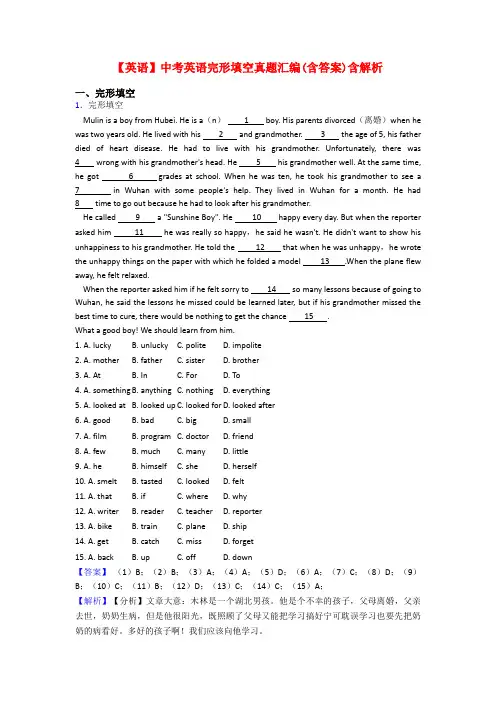
【英语】中考英语完形填空真题汇编(含答案)含解析一、完形填空1.完形填空Mulin is a boy from Hubei. He is a(n) 1 boy. His parents divorced(离婚)when he was two years old. He lived with his 2 and grandmother. 3 the age of 5, his father died of heart disease. He had to live with his grandmother. Unfortunately, there was 4 wrong with his grandmother's head. He 5 his grandmother well. At the same time,he got 6 grades at school. When he was ten, he took his grandmother to see a7 in Wuhan with some people's help. They lived in Wuhan for a month. He had8 time to go out because he had to look after his grandmother.He called 9 a "Sunshine Boy". He 10 happy every day. But when the reporter asked him 11 he was really so happy,he said he wasn't. He didn't want to show his unhappiness to his grandmother. He told the 12 that when he was unhappy,he wrote the unhappy things on the paper with which he folded a model 13 .When the plane flew away, he felt relaxed.When the reporter asked him if he felt sorry to 14 so many lessons because of going to Wuhan, he said the lessons he missed could be learned later, but if his grandmother missed the best time to cure, there would be nothing to get the chance 15 .What a good boy! We should learn from him.1. A. lucky B. unlucky C. polite D. impolite2. A. mother B. father C. sister D. brother3. A. At B. In C. For D. To4. A. something B. anything C. nothing D. everything5. A. looked at B. looked up C. looked for D. looked after6. A. good B. bad C. big D. small7. A. film B. program C. doctor D. friend8. A. few B. much C. many D. little9. A. he B. himself C. she D. herself10. A. smelt B. tasted C. looked D. felt11. A. that B. if C. where D. why12. A. writer B. reader C. teacher D. reporter13. A. bike B. train C. plane D. ship14. A. get B. catch C. miss D. forget15. A. back B. up C. off D. down【答案】(1)B;(2)B;(3)A;(4)A;(5)D;(6)A;(7)C;(8)D;(9)B;(10)C;(11)B;(12)D;(13)C;(14)C;(15)A;【解析】【分析】文章大意:木林是一个湖北男孩。
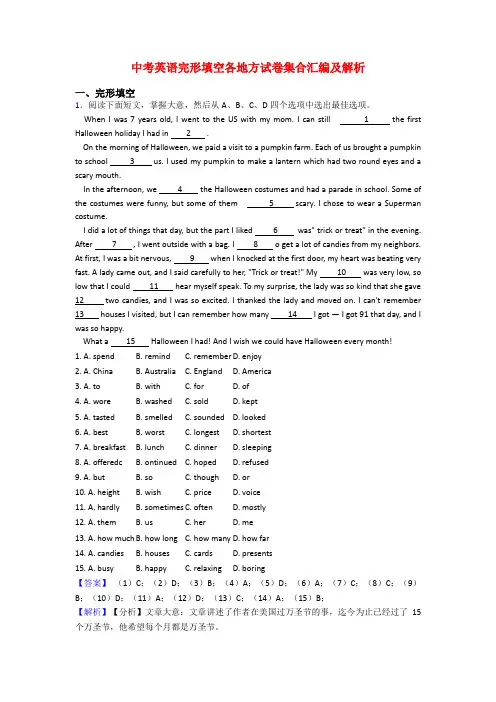
中考英语完形填空各地方试卷集合汇编及解析一、完形填空1.阅读下面短文,掌握大意,然后从A、B、C、D四个选项中选出最佳选项。
When I was 7 years old, I went to the US with my mom. I can still 1 the first Halloween holiday I had in 2 .On the morning of Halloween, we paid a visit to a pumpkin farm. Each of us brought a pumpkinto school 3 us. I used my pumpkin to make a lantern which had two round eyes and a scary mouth.In the afternoon, we 4 the Halloween costumes and had a parade in school. Some of the costumes were funny, but some of them 5 scary. I chose to wear a Superman costume.I did a lot of things that day, but the part I liked 6 was" trick or treat" in the evening. After 7 , I went outside with a bag. I 8 o get a lot of candies from my neighbors.At first, I was a bit nervous, 9 when I knocked at the first door, my heart was beating very fast. A lady came out, and I said carefully to her, "Trick or treat!" My 10 was very low, so low that I could 11 hear myself speak. To my surprise, the lady was so kind that she gave12 two candies, and I was so excited. I thanked the lady and moved on. I can't remember13 houses I visited, but I can remember how many 14 I got — I got 91 that day, and I was so happy.What a 15 Halloween I had! And I wish we could have Halloween every month!1. A. spend B. remind C. remember D. enjoy2. A. China B. Australia C. England D. America3. A. to B. with C. for D. of4. A. wore B. washed C. sold D. kept5. A. tasted B. smelled C. sounded D. looked6. A. best B. worst C. longest D. shortest7. A. breakfast B. lunch C. dinner D. sleeping8. A. offeredc B. ontinued C. hoped D. refused9. A. but B. so C. though D. or10. A. height B. wish C. price D. voice11. A. hardly B. sometimes C. often D. mostly12. A. them B. us C. her D. me13. A. how much B. how long C. how many D. how far14. A. candies B. houses C. cards D. presents15. A. busy B. happy C. relaxing D. boring【答案】(1)C;(2)D;(3)B;(4)A;(5)D;(6)A;(7)C;(8)C;(9)B;(10)D;(11)A;(12)D;(13)C;(14)A;(15)B;【解析】【分析】文章大意:文章讲述了作者在美国过万圣节的事,迄今为止已经过了15个万圣节,他希望每个月都是万圣节。
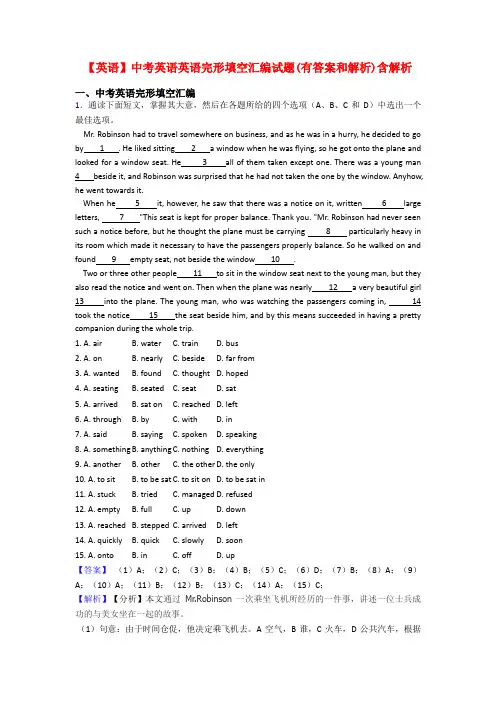
【英语】中考英语英语完形填空汇编试题(有答案和解析)含解析一、中考英语完形填空汇编1.通读下面短文,掌握其大意,然后在各题所给的四个选项(A、B、C和D)中选出一个最佳选项。
Mr. Robinson had to travel somewhere on business, and as he was in a hurry, he decided to goby 1 . He liked sitting 2 a window when he was flying, so he got onto the plane and looked for a window seat. He 3 all of them taken except one. There was a young man 4 beside it, and Robinson was surprised that he had not taken the one by the window. Anyhow, he went towards it.When he 5 it, however, he saw that there was a notice on it, written 6 large letters, 7 "This seat is kept for proper balance. Thank you. "Mr. Robinson had never seen such a notice before, but he thought the plane must be carrying 8 particularly heavy inits room which made it necessary to have the passengers properly balance. So he walked on and found 9 empty seat, not beside the window 10 .Two or three other people 11 to sit in the window seat next to the young man, but they also read the notice and went on. Then when the plane was nearly 12 a very beautiful girl 13 into the plane. The young man, who was watching the passengers coming in, 14 took the notice 15 the seat beside him, and by this means succeeded in having a pretty companion during the whole trip.1. A. air B. water C. train D. bus2. A. on B. nearly C. beside D. far from3. A. wanted B. found C. thought D. hoped4. A. seating B. seated C. seat D. sat5. A. arrived B. sat on C. reached D. left6. A. through B. by C. with D. in7. A. said B. saying C. spoken D. speaking8. A. something B. anything C. nothing D. everything9. A. another B. other C. the other D. the only10. A. to sit B. to be sat C. to sit on D. to be sat in11. A. stuck B. tried C. managed D. refused12. A. empty B. full C. up D. down13. A. reached B. stepped C. arrived D. left14. A. quickly B. quick C. slowly D. soon15. A. onto B. in C. off D. up【答案】(1)A;(2)C;(3)B;(4)B;(5)C;(6)D;(7)B;(8)A;(9)A;(10)A;(11)B;(12)B;(13)C;(14)A;(15)C;【解析】【分析】本文通过Mr.Robinson一次乘坐飞机所经历的一件事,讲述一位士兵成功的与美女坐在一起的故事。
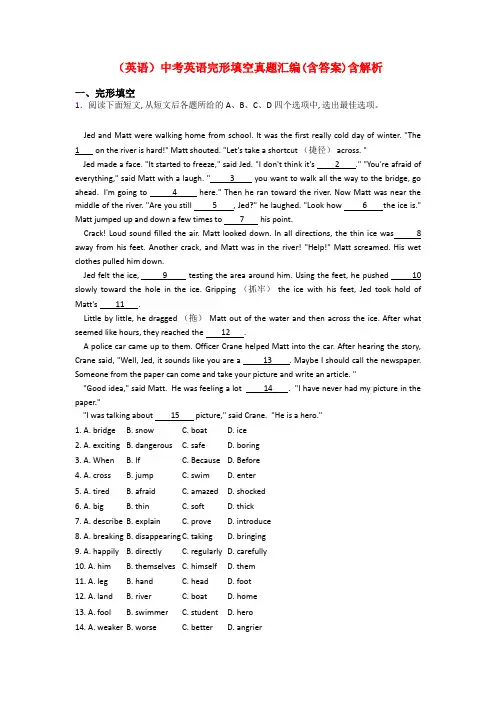
(英语)中考英语完形填空真题汇编(含答案)含解析一、完形填空1.阅读下面短文, 从短文后各题所给的A、B、C、D四个选项中, 选出最佳选项。
Jed and Matt were walking home from school. It was the first really cold day of winter. "The 1 on the river is hard!" Matt shouted. "Let's take a shortcut (捷径) across. "Jed made a face. "It started to freeze," said Jed. "I don't think it's 2 ." "You're afraid of everything," said Matt with a laugh. " 3 you want to walk all the way to the bridge, go ahead. I'm going to 4 here." Then he ran toward the river. Now Matt was near the middle of the river. "Are you still 5 , Jed?" he laughed. "Look how 6 the ice is." Matt jumped up and down a few times to 7 his point.Crack! Loud sound filled the air. Matt looked down. In all directions, the thin ice was 8 away from his feet. Another crack, and Matt was in the river! "Help!" Matt screamed. His wet clothes pulled him down.Jed felt the ice, 9 testing the area around him. Using the feet, he pushed 10 slowly toward the hole in the ice. Gripping (抓牢)the ice with his feet, Jed took hold of Matt's 11 .Little by little, he dragged (拖) Matt out of the water and then across the ice. After what seemed like hours, they reached the 12 .A police car came up to them. Officer Crane helped Matt into the car. After hearing the story, Crane said, "Well, Jed, it sounds like you are a 13 . Maybe I should call the newspaper. Someone from the paper can come and take your picture and write an article. ""Good idea," said Matt. He was feeling a lot 14 . "I have never had my picture in the paper.""I was talking about 15 picture," said Crane. "He is a hero."1. A. bridge B. snow C. boat D. ice2. A. exciting B. dangerous C. safe D. boring3. A. When B. If C. Because D. Before4. A. cross B. jump C. swim D. enter5. A. tired B. afraid C. amazed D. shocked6. A. big B. thin C. soft D. thick7. A. describe B. explain C. prove D. introduce8. A. breaking B. disappearing C. taking D. bringing9. A. happily B. directly C. regularly D. carefully10. A. him B. themselves C. himself D. them11. A. leg B. hand C. head D. foot12. A. land B. river C. boat D. home13. A. fool B. swimmer C. student D. hero14. A. weaker B. worse C. better D. angrier15. A. Matt's B. Jed's C. Crane's D. others'【答案】(1)D;(2)C;(3)B;(4)A;(5)B;(6)D;(7)C;(8)A;(9)D;(10)C;(11)B;(12)A;(13)D;(14)C;(15)B;【解析】【分析】记叙两为同学步行回家,其中一名同学想走捷径而落入河中的故事。
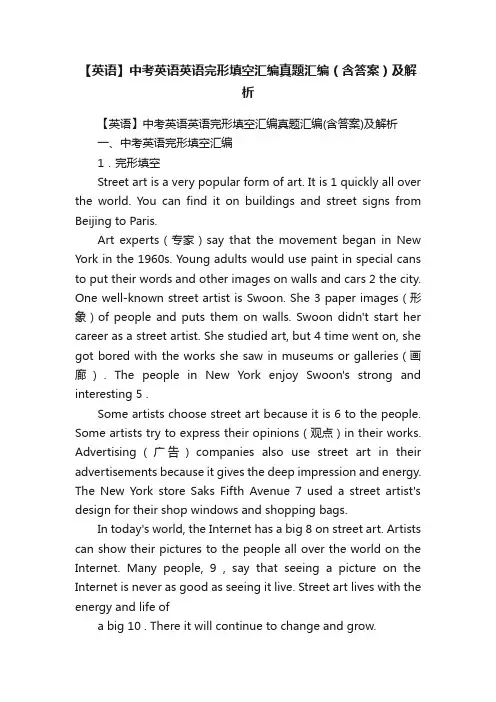
【英语】中考英语英语完形填空汇编真题汇编(含答案)及解析【英语】中考英语英语完形填空汇编真题汇编(含答案)及解析一、中考英语完形填空汇编1.完形填空Street art is a very popular form of art. It is 1 quickly all over the world. You can find it on buildings and street signs from Beijing to Paris.Art experts(专家)say that the movement began in New York in the 1960s. Young adults would use paint in special cans to put their words and other images on walls and cars 2 the city. One well-known street artist is Swoon. She 3 paper images(形象)of people and puts them on walls. Swoon didn't start her career as a street artist. She studied art, but 4 time went on, she got bored with the works she saw in museums or galleries(画廊). The people in New York enjoy Swoon's strong and interesting 5 .Some artists choose street art because it is 6 to the people. Some artists try to express their opinions(观点)in their works. Advertising(广告)companies also use street art in their advertisements because it gives the deep impression and energy. The New York store Saks Fifth Avenue 7 used a street artist's design for their shop windows and shopping bags.In today's world, the Internet has a big 8 on street art. Artists can show their pictures to the people all over the world on the Internet. Many people, 9 , say that seeing a picture on the Internet is never as good as seeing it live. Street art lives with the energy and life ofa big 10 . There it will continue to change and grow.1. A. watching B. making C. spreading D. searching2. A. behind B. by C. over D. around3. A. cuts down B. cuts out C. turns down D. runs out4. A. as B. after C. before D. while5. A. style B. story C. problem D. program6. A. safer B. lower C. closer D. stranger7. A. hardly B. recently C. seldom D. never8. A. success B. discount C. present D. influence9. A. anyway B. however C. otherwise D. therefore10. A. museum B. country C. city D. street【答案】(1)C;(2)D;(3)B;(4)A;(5)A;(6)C;(7)B;(8)D;(9)B;(10)C;【解析】【分析】本文介绍了街头艺术是一种非常受欢迎的艺术形式,它正在快速的在全世界传播。
(英语)中考英语英语完形填空汇编真题汇编(含答案)及解析一、中考英语完形填空汇编1.完形填空Making friends is a skill. Like most skills, it improves with 1 . If you want to meet people and make friends, you must take some action. You must first go where there are people. You won't make friends if you stay at home alone. Join a club or a group, for talking with those who 2 the same things as you do is easier. 3 join someone in some activities.Many people are 4 when talking to new people. After all (毕竟), meeting strangers means facing the unknown. And it's human nature to feel a bit uncomfortable about the unknown. Most of our fears about dealing with new people come from doubts about ourselves. We 5 other people who are judging (评判) us finding us too tall or too short, too thisor too that. But don't forget that they must be feeling the same way. Try to accept yourself 6 you are, and you will feel more comfortable.Try to be self-confident even if you don't feel that way. When you enter a room full of strangers, such as a new classroom, walk tall and straight, look 7 at other people and smile. If you see someone you'd like to 8 something to, don't wait for the other person to start a conversation.Just meeting someone new doesn't mean that you'll make friends with that person. Friendshipis 9 on mutual liking and "give and take". It 10 time and effort to develop.1. A. age B. practice C. skill D. everything2. A. like B. share C. have D. keep3. A. So B. Or C. However D. But4. A. sad B. upset C. nervous D. unhappy5. A. suggest B. consider C. doubt D. imagine6. A. what B. who C. that D. as7. A. lonely B. friendly C. directly D. sadly8. A. speak B. say C. talk D. tell9. A. depend B. laid C. taken D. based10. A. takes B. spends C. costs D. pays【答案】(1)B;(2)A;(3)A;(4)C;(5)D;(6)D;(7)C;(8)B;(9)D;(10)A;【解析】【分析】文章大意:交友是一项技能,短文介绍了交友的技巧。
英语英语完形填空汇编题20套(带答案)及解析一、中考英语完形填空汇编1.完形填空"You don't understand me!" I shouted. Then I ran out of the house and got on a bus. I didn't know 1 it was going. I just wanted to get away from home as 2 as 1 could.I couldn't 3 what had just happened to me. My mother, the person I believe in, had just read all of my 4 from my close friends! It shouldn't have happened to me. She read my letters and told me not to write to 5 any more! I couldn't 6 the tears from falling when I thought about this.Later that day, I went to my close 7 house. 8 my friend gave me a cup of water, the phone rang."It's your mother," she spoke to me in a low 9 ."Tell her that I'm not here!" I replied. However, my mother heard it. "Tell her not to leave! I'll be right there!" Then she hung up the phone 10 a "goodbye". In fact, I should say that I was a little 11 . I couldn't imagine what would happen.But to my 12 , when my mother arrived, "sorry" was the first word she 13 to me. Her 14 told me that she had been crying and her voice told me that she was really tired. "Will you forgive me?" at last she asked. I didn't know what to say. I just 15 her, and gave her a big hug.She held me so tightly. You know, at that time, I felt so warm. I really love you, Mum!1. A. where B. what C. why D. when2. A. happily B. slowly C. carefully D. quickly3. A. remember B. talk C. believe D. ask4. A. letters B. books C. magazinesD. novels5. A. him B. them C. you D. her6. A. make B. think C. stop D. find7. A. classmate's B. relative's C. teacher's D. friend's8. A. Unless B. If C. After D. Since9. A. voice B. sound C. noise D. silence10. A. during B. without C. towards D. from11. A. satisfied B. bored C. worried D. interested12. A. surprise B. mind C. body D. heart13. A. told B. said C. asked D. heard14. A. ears B. arms C. hands D. eyes15. A. ran to B. gave up C. went on D. pushed in【答案】(1)A;(2)D;(3)C;(4)A;(5)B;(6)C;(7)D;(8)C;(9)A;(10)B;(11)C;(12)A;(13)B;(14)D;(15)A;【解析】【分析】本文讲述了作者因不满妈妈瞒着她偷看信件,导致离家出走,但最后被妈妈所感动而原谅了妈妈。
初三英语英语完形填空汇编真题汇编(含答案)含解析一、中考英语完形填空汇编1.完形填空Do you ever watch old films?Maybe you will see one with Carole Lombard. She was a famous 1 in the 1930s.She died when she was only 34. In her 2 life she made 70 films!Lombard's real name was Jane Alice Peters. In about 1921, she was playing baseball in the 3 near her home. A film director 4 her and decided to put her in a film. She was about13 at that time. The film was one of the last silent films. She acted(表演)so well that she 5 the hearts of some people. At 16, she left school to act.In 1925, she had an agreement with a 6 studio, 20th Century Fox. The studio gave 7 a new name, and she acted in several films. Then, at age 18, she was in a bad car accident. The accident left scars(伤疤)on her face. The studio broke the agreement, but she did not 8 . She continued to act.It was Paramount Pictures that made Lombard a 9 . She made many films for the studio. She also married two of their stars. Lombard was married to actor William Powell for only 26 months. 10 seven years later, she married the great love of her life, actor Clark Gable. It was a great Hollywood love story.1. A. nurse B. actress C. doctor2. A. short B. lazy C. long3. A. kitchen B. classroom C. street4. A. forgot B. saw C. hurt5. A. broke B. avoided C. won6. A. dance B. film C. music7. A. me B. it C. her8. A. give up B. have a try C. make sure9. A. scientist B. writer C. star10. A. But B. Before C. Since【答案】(1)B;(2)A;(3)C;(4)B;(5)C;(6)B;(7)C;(8)A;(9)C;(10)A;【解析】【分析】本文介绍了Carole Lombard是如何开始自己的演绎生涯的。
【英语】中考英语完形填空真题汇编(含答案)及解析【英语】中考英语完形填空真题汇编(含答案)及解析一、完形填空1.完形填空When I had something difficult to do, I liked to ask my mother for 1 . But she alwayssaid, "Do it yourself, dear." I was not happy about this at all. I thought she was the 2 mother I had ever seen!For example, one day, I decided to 3 some friends to my home. My bedroom was not in order. Books were 4 , and I didn't make the bed. I asked my mother to help me clean it, but she 5 said, "Do it yourself."Because of my "lazy mother", I had to 6 my clothes and clean my room. I had to help my parents do 7 . I even had to go to the doctor by myself. It was really difficult for me to do a good job, but I have 8 a lot.As time goes by, I start to understand my mother. She made9 clever and hard-working.A 10 mother is worth 100 teachers! Do you think so?1. A. money B. help C. time2. A. tallest B. happiest C. laziest3. A. leave B. invite C. visit4. A. everywhere B. somewhere C. nowhere5. A. never B. sometimes C. still6. A. wash B. move C. buy7. A. job B. homework C. housework8. A. learned B. told C. shown9. A. I B. mine C. me10. A. young B. good C. happy【答案】(1)B;(2)C;(3)B;(4)A;(5)C;(6)A;(7)C;(8)A;(9)C;(10)B;【解析】【分析】大意:儿时认为最懒散的妈妈,随着时间的流逝,作者开始明白了自己的妈妈是最好的妈妈,是妈妈让自己变得聪明和勤劳。
中考英语-完形填空真题10套(含详解)(1)【2011昆明】从A,B,C三个选项中选出能填入空白处的最佳答案。
(共10小题,每小题1分,满分10分)A green life sometimes just needs a good idea like sharing cars. It’s a new way of thinking. You can use a car but you don’t need to own it. Now the idea of “car sharing”has become 51 in many countries. As we know, most cars 52 in garages for much time. In fact, we drive our own cars 53 one or two hours a day on average(平均). When we don’t use them, we have to pay for parking and 54 things. That costs too much money. To 55 money, some people come up with the idea of “car sharing”. If we share a car, we’ll only 56 when we use it.Now many people are starting to do car sharing. In Switzerland, almost 40,000 people have 57 it. Japan is also trying to make 58 popular around the country.Car sharing is the beginning of a new idea in 59 . It is also very for us to travel everywhere 60 buying a car. Do you love to share a car with others?51. A. popular B. interesting C. funny52. A. are washed B. are driven C. are parked53. A. as far as B. as long as C. as much as54. A. other B. others C. another55. A. make B. save C. find56. A. spend B. cost C. pay57. A. joined B. covered C. dropped58. A. time saving B. money saving C. car sharing59. A. fashion B. transportation C. family60. A. without B. with C. by【主旨大意】:在目前大城市车辆拥堵越来越严重的情况下,“共车”不仅节约钱,减轻大城市交通压力,还可以到处旅游。
中考英语完形填空10篇——(附带答案解析)中考英语完形填空10篇——(附带答案解析)1------Several years ago I studied in a university in the biggest city in our country. It's beautiful but it's hot in __1__. So I usually returned to my hometown when my __2__ began. It is not big, but it's cool and quiet. I could __3__ in the daytime and have a good sleep at night.One day I had some __4__ to solve. But I didn't take the dictionaries home. My father told me Charlie, one of my __5__, had a good library. I went to his house at once. We didn't see each other after I __6__ middle school. At first he didn't recognize me. He __7__ me up and down. And then he called out, "Oh, dear! It's you, Fred!"Of course we were __8__ to meet each other again and talked a lot about our schoolmates and __9__. Later on he showed me around his library. It wasn't big but there were a lot of nice books in it. And the dictionaries I __10__ were in them too. At last I said, "__11__ you lend some dictionaries to me, please?""I'm sorry I don't lend any books to __12__," said the young man."Are you afraid I'll __13__ them?""No, I'm not. I'm afraid you won't __14__ them to me. Look! All the books are not __15__, but borrowed!"1.A. spring B. summerC. autumnD. winter2.A. birthdayB. SaturdayC. SundayD. holiday3.A. studyB. playC. restD. run4.A. wordsB. sentencesC. problemsD. stories5.A. brothersB. sistersC. auntsD. classmates6.A. finishedB. heardC. sawD. met7.A. liftedB. carriedC. lookedD. pulled8.A. angryB. happyC. worriedD. sad9.A. doctorsB. teachersC. workersD. drivers10.A. looked forB. readC. wroteD. looked at11.A. NeedB. MustC. MayD. Can12.A. otherB. the otherC. othersD. another13.A. loseB. sellC. throwD. know14.A. payB. returnC. useD. look after15.A. madeB. pickedC. wonD. bought名师点评这篇短文主要讲了Charlie家里有许多藏书,却没有一本是自己买的,所以他从不借书给别人,因为他怕别人都和他一样。